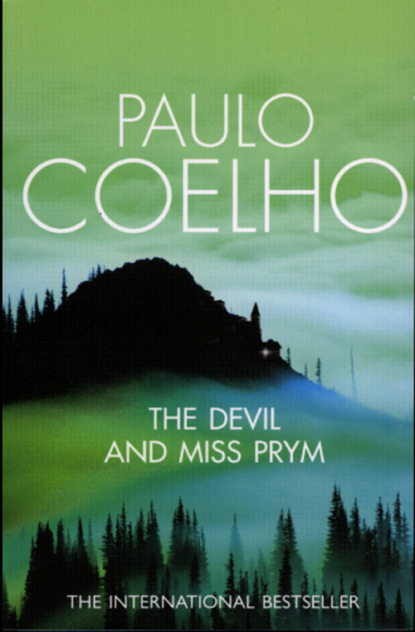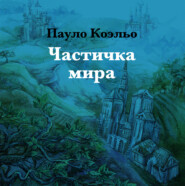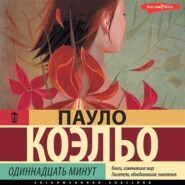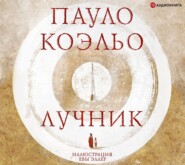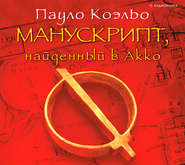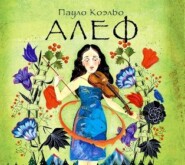По всем вопросам обращайтесь на: info@litportal.ru
(©) 2003-2024.
✖
The Devil and Miss Prym
Автор
Год написания книги
2019
Настройки чтения
Размер шрифта
Высота строк
Поля
THE VALKYRIES (#litres_trial_promo)
VERONIKA DECIDES TO DIE (#litres_trial_promo)
CONFESSIONS OF A PILGRIM (#litres_trial_promo)
MANUAL OF THE WARRIOR OF LIGHT (#litres_trial_promo)
ELEVEN MINUTES (#litres_trial_promo)
ALSO BY PAULO COELHO (#litres_trial_promo)
Copyright (#litres_trial_promo)
About the Publisher (#litres_trial_promo)
Author’s note (#ulink_0ef01b66-f158-59ae-bd9d-41b3305aa8a8)
The first story about division comes from ancient Persia: the god of time, having created the universe, sees harmony all around him, but feels that there is still something very important missing – a companion with whom to share all this beauty.
For a thousand years, he prays for a son. The story does not say to whom he prays, given that he is omnipotent, the sole, supreme lord; nevertheless, he prays and, finally, he becomes pregnant.
When he realises he has achieved his heart’s desire, the god of time is filled with remorse, suddenly conscious of how fragile the balance of things is. But it is too late and the child is already on its way. All he achieves by his lamentations is to cause the son he is carrying in his belly to divide into two.
The legend recounts that just as Good (Ormuzd) is born out of the god of time’s prayers, so Evil (Ahriman) is born out of his remorse – twin brothers.
The concerned father arranges everything so that Ormuzd will emerge first from his belly, to take charge of his brother and to prevent Ahriman from throwing the universe into confusion. However, Evil – being very intelligent and resourceful – manages to push Ormuzd aside at the moment of their birth, and thus is the first to see the light of the stars.
Distraught, the god of time resolves to forge alliances on Ormuzd’s behalf: he brings into being the human race so that they can fight alongside Ormuzd and stop Ahriman taking control of everything.
In the Persian legend, the human race is born to be the ally of Good, and, according to tradition, Good will triumph in the end. However, many centuries later, another story about division emerges, this time presenting the opposite view: man as the instrument of Evil.
I imagine that most people will know which story I mean. A man and a woman are in the Garden of Eden, enjoying every imaginable delight. But one thing is forbidden: the couple can never know the meaning of Good and Evil. The Lord God says (Genesis 2: 17): ‘But of the tree of the knowledge of Good and Evil, thou shalt not eat of it…’.
And one fine day the serpent appears, swearing that this knowledge is more important than paradise itself and that they should possess that knowledge. The woman refuses, saying that God has threatened her with death, but the serpent assures her that nothing of the kind will happen but quite the contrary, for on the day when they learn what Good and Evil are, they will become God’s equals.
Convinced, Eve eats of the forbidden fruit and gives some of it to Adam. From this moment on, the original balance of paradise is destroyed, and the pair are driven out of paradise and cursed. Yet there remain some enigmatic words spoken by God and which confirm what the serpent said: ‘Behold, the man is become as one of us, to know Good and Evil…’. Here, too (as with the god of time who prays for something even though he himself is the lord of the universe), the Bible fails to explain to whom the one God is speaking, and – assuming he is unique – why he should use the expression ‘one of us’.
Whatever the answer, it is clear that from its very inception the human race has been condemned to exist within the eternal division, always moving between those two opposing poles. So here we are, afflicted by the same doubts as our ancestors. The aim of this book is to tackle this theme, occasionally interpolating into the plot other legends on the subject drawn from the four corners of the earth.
The Devil and Miss Prym concludes the trilogy And on the Seventh Day. The first two books were: By the River Piedra I Sat Down and Wept (1994) and Veronika Decides to Die (1998). Each of the three books is concerned with a week in the life of ordinary people, all of who find themselves suddenly confronted by love, death and power. I have always believed that in the lives of individuals, just as in society at large, the profoundest changes take place within a very reduced time frame. When we least expect it, life sets us a challenge to test our courage and willingness to change; at such a moment, there is no point in pretending that nothing has happened or in saying that we are not yet ready.
The challenge will not wait. Life does not look back. A week is more than enough time for us to decide whether or not to accept our destiny.
Buenos Aires, August 2000
For almost fifteen years (#ulink_6b404181-f351-5b9d-9881-0df48341795c), old Berta had spent every day silting outside her front door. The people of Viscos knew that this was normal behaviour amongst old people: they sit dreaming of the past and of their youth; they look out at a world in which they no longer play a part and try to find something to talk to the neighbours about.
Berta, however, had a reason for being there. And that morning her waiting came to an end when she saw the stranger climbing the steep hill up to the village, heading for its one hotel. He did not look as she had so often imagined he would: his clothes were shabby, he wore his hair unfashionably long, he was unshaven.
And he was accompanied by the Devil.
‘My husband’s right,’ she said to herself. ‘If I hadn’t been here, no one would have noticed.’
She was hopeless at telling people’s ages and put the man’s somewhere between forty and fifty. ‘A youngster,’ she thought, using a scale of values that only old people understand. She wondered how long he would be staying, but reached no conclusion; it might be only a short time, since all he had with him was a small rucksack. He would probably just stay one night before moving on to a fate about which she knew nothing and cared even less.
Even so, all the years she had spent sitting by her front door waiting for his arrival had not been in vain, because they had taught her the beauty of the mountains, something she had never really noticed before, simply because she had been born in that place and had always tended to take the landscape for granted.
As expected, the stranger went into the hotel. Berta wondered if she should go and warn the priest about this undesirable visitor, but she knew he wouldn’t listen to her, dismissing the matter as the kind of thing old people like to worry about.
So now she just had to wait and see what happened. It doesn’t take a devil much time to bring about destruction; they are like storms, hurricanes or avalanches, which, in a few short hours, can destroy trees planted two hundred years before. Suddenly, Berta realised that the mere fact that Evil had just arrived in Viscos did not change anything: devils come and go all the time without necessarily affecting anything by their presence. They are constantly abroad in the world, some times simply to find out what’s going on, at others to put some soul or other to the test. But they are fickle creatures, and there is no logic in their choice of target, being drawn merely by the pleasure of a battle worth fighting. Berta concluded that there was nothing sufficiently interesting or special about Viscos to attract the attention of anyone for more than a day, let alone someone as important and busy as a messenger from the dark.
She tried to turn her mind to something else, but she couldn’t get the image of the stranger out of her head. The sky, which had been clear and bright up until then, suddenly clouded over.
‘That’s normal, it always happens at this time of year,’ she thought. It was simply a coincidence and had nothing to do with the stranger’s arrival.
Then, in the distance, she heard a clap of thunder, followed by another three. On the one hand, this simply meant that rain was on the way; on the other, if the old superstitions of the village were to be believed, the sound could be interpreted as the voice of an angry God, protesting that mankind had grown indifferent to His presence.
‘Perhaps I should do something. After all, what I was waiting for has finally happened.’
She sat for a few minutes, paying close attention to everything going on around her; the clouds had continued to gather above the village, but she heard no other sounds. As a good ex-Catholic, she put no store by traditions and superstitions, especially those of Viscos, which had their roots in the ancient Celtic civilisation that once existed in the place.
‘A thunderclap is an entirely natural phenomenon. If God wanted to talk to man, he wouldn’t use such roundabout methods.’
She had just thought this when she again heard a peal of thunder accompanied by a flash of lightning – a lot closer this time. Berta got to her feet, picked up her chair and went into her house before the rain started; but this time she felt her heart contract with an indefinable fear.
‘What should I do?’
Again she wished that the stranger would simply leave at once; she was too old to help herself or her village, far less assist Almighty God, who, if He needed any help, would surely have chosen someone younger. This was all just some insane dream; her husband clearly had nothing better to do than to invent ways of helping her pass the time.
But of one thing she was sure, she had seen the Devil.
In the flesh and dressed as a pilgrim.
The hotel was, at (#ulink_7f44cde3-9fc3-5888-a230-2eb5cb1039b4)one and the same time, a shop selling local products, a restaurant serving food typical of the region, and a bar where the people of Viscos could gather to talk about what they always talked about: how the weather was doing, or how young people had no interest in the village. ‘Nine months of winter, three months of hell,’ they used to say, referring to the fact that each year they had only ninety days to carry out all the work in the fields, fertilising, sowing, waiting, then harvesting the crops, storing the hay and shearing the sheep.
Everyone who lived there knew they were clinging to a world whose days were numbered; even so, it was not easy for them to accept that they would be the last generation of the farmers and shepherds who had lived in those mountains for centuries. Sooner or later the machines would arrive, the livestock would be reared far from there on special food, the village itself might well be sold to a big multinational that would turn it into a ski resort.
That is what had happened to other villages in the region, but Viscos had resisted – because it owed a debt to the past, to the strong traditions of those ancestors who had once chosen to live here, and who had taught them the importance of fighting to the bitter end.
The stranger carefully read the form he was given to fill in at the hotel, deciding what he was going to put. From his accent, they would know he came from some South American country, and he decided it should be Argentina, because he really liked their football team. In the space left for his address, he wrote Colombia Street, knowing that South Americans are in the habit of paying homage to each other by naming important places after neighbouring countries. As his name, he chose that of a famous terrorist from the previous century.
In less than two hours, all the 281 inhabitants of Viscos knew that a stranger named Carlos had arrived in the village, that he had been born in Argentina and now lived in a pleasant street in Buenos Aires. That is the advantage of very small villages: without making the slightest effort, you can learn all there is to know about a person’s life.
Which was precisely what the newcomer wanted.
He went up to his room and unpacked his rucksack: it contained a few clothes, a shaving kit, an extra pair of shoes, vitamins to ward off colds, a thick notebook to write in, and eleven bars of gold, each weighing two kilos. Worn out by tension, by the climb and by the weight he had been carrying, the stranger fell asleep almost at once, though not before placing a chair under the door handle, even though he knew he could count on each and every one of Viscos’ 281 inhabitants. The next morning he ate breakfast, left his dirty clothes at reception to be laundered, put the gold bars back in his rucksack, and set off for the mountain to the east of the village. On his way, he saw only one villager, an old woman sitting in front of her house, who was looking at him with great interest.
He plunged into the forest, where he waited until his hearing had become used to the noises made by the insects and birds, and by the wind rattling the leafless branches; he knew that in a place like this someone could easily be observing him without his being aware of it, so he stood there for almost an hour without doing anything.





